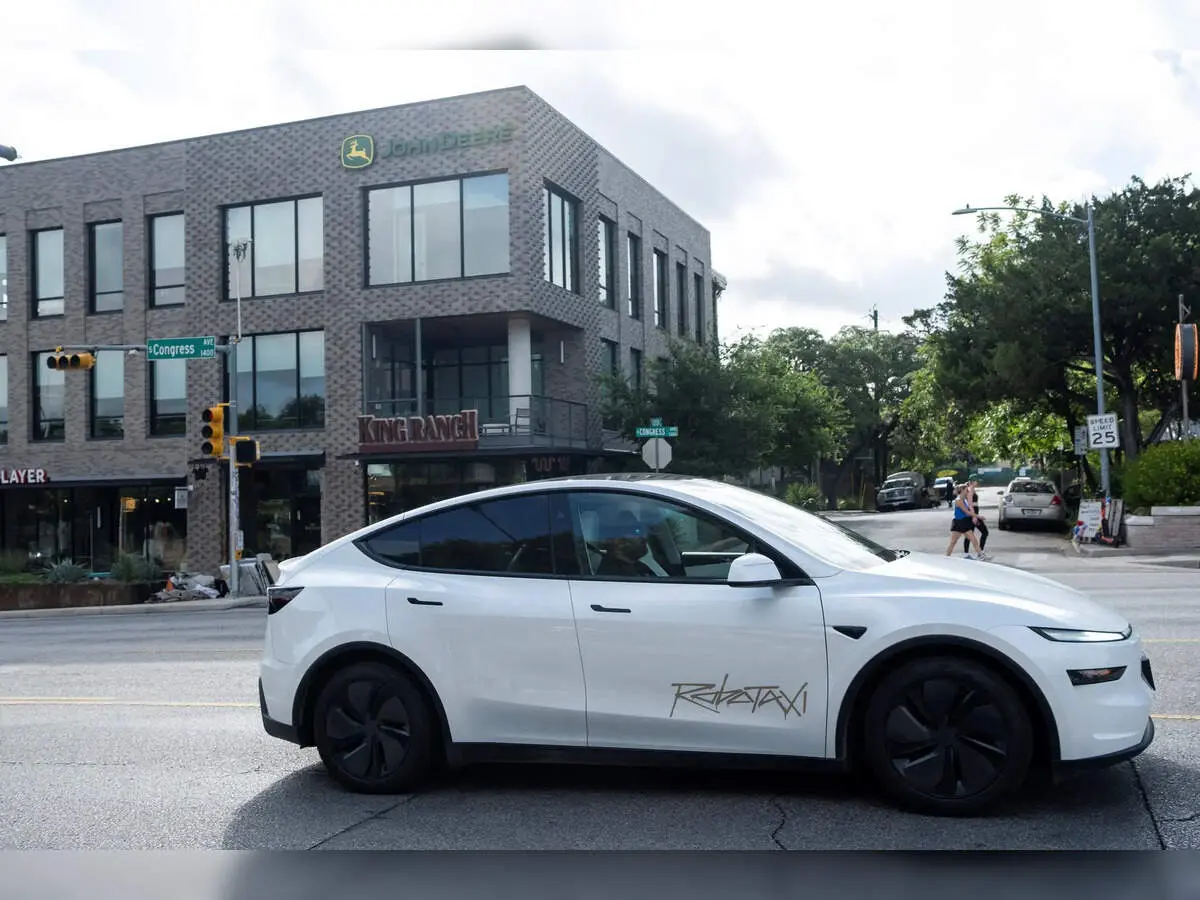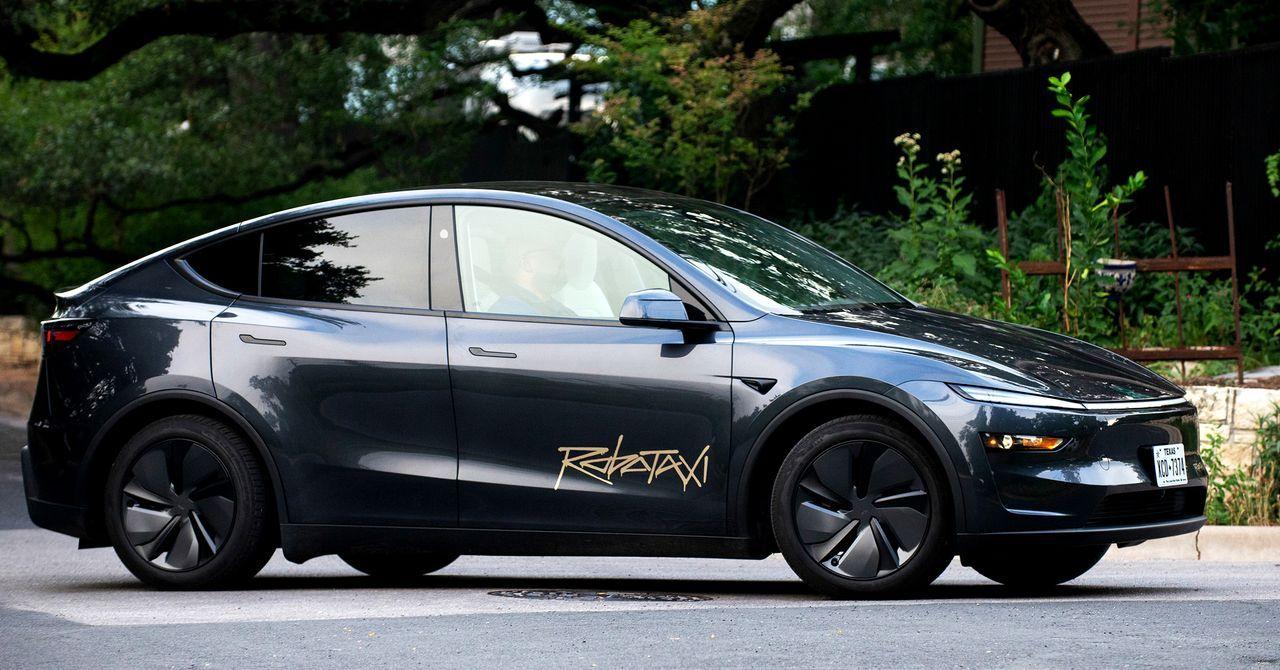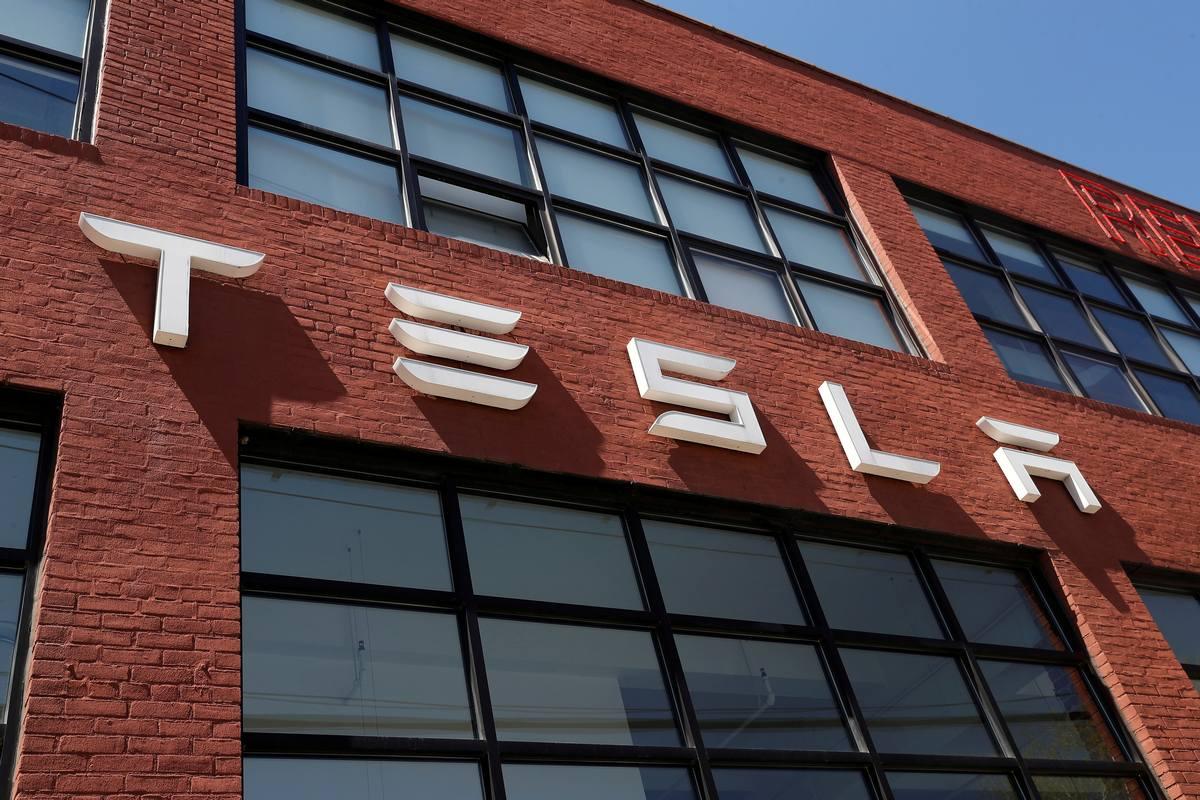Tesla's Robotaxi Expansion Plans Face Regulatory Hurdles in California
3 Sources
3 Sources
[1]
Tesla to expand robotaxis to San Francisco area within two months, Musk says - The Economic Times
Tesla last month rolled out a test of the long-promised service in a limited area of Austin, Texas, with about a dozen vehicles, a select group of passengers and many restrictions, including a safety monitor in the front passenger seat.Tesla will expand its robotaxi service to the San Francisco Bay Area "in a month or two", depending on regulatory approvals, CEO Elon Musk said on Wednesday. Tesla will expand the service to "a larger area in Austin this weekend," Musk said on his social media platform X in response to a post from a user about the lack of an update on expansion. Musk did not specify the location or size of the expansion. Another X user - Tesla Owners Silicon Valley - then asked about an expansion to the Bay Area, and Musk replied, "Waiting on regulatory approvals, but probably in a month or two." The successful expansion of robotaxis will be crucial to Tesla's future as sales of its aging lineup of electric vehicles have slumped amid rising competition and a backlash against Musk's embrace of far-right political views. Much of the company's trillion-dollar valuation hangs on Musk's bet on robotaxis and humanoid robots that are powered by artificial intelligence. Commercializing autonomous vehicles has been harder than anticipated with high costs, tight regulations and investigations forcing many, including General Motors' Cruise unit, to shut down. Until Tesla's recent rollout, Alphabet's Waymo was the only company running driverless robotaxis charging fees from passengers. Waymo with about 1,500 vehicles has been expanding its service cautiously for years and is currently available in San Francisco and other cities in the Bay Area, Los Angeles, Phoenix, Austin and Atlanta. Musk has said Tesla will ramp up the service rapidly to other U.S. cities. But while Tesla faced almost no regulation in Texas, California tightly controls where and how firms can operate autonomous vehicles and requires testing data for permits. In California, Tesla would need a series of permits from the state's Department of Motor Vehicles (DMV) and the California Public Utilities Commission (CPUC) to operate a fully autonomous robotaxi service that charges customers. The CPUC in March gave Tesla the first in a series of approvals required to eventually launch the service. The DMV and CPUC did not respond to Reuters' requests for comments outside of regular business hours. Tesla's public test in Austin led to multiple traffic problems and driving issues, social media videos from the company-selected riders showed over the first few days.
[2]
Tesla has not yet applied for robotaxi permits in California, state regulators say
(Reuters) -Tesla has yet to apply for regulatory permits it needs to operate driverless taxis in California, two state regulators said on Thursday, a day after CEO Elon Musk said the company would expand its robotaxis to the San Francisco Bay Area within two months. "To date, Tesla has not applied for either a driverless testing or deployment permit," a spokesperson for California's Department of Motor Vehicles said in an email to Reuters on Thursday. The California Public Utilities Commission (CPUC), which in March issued the first in a series of permits Tesla requires, said on Thursday the company had not yet applied for any new permits. All it has so far is a transportation charter-party carrier permit (TCP) typically associated with chauffeur-operated services, which allows Tesla to own and control a fleet of vehicles and transport employees on pre-arranged trips. The successful expansion of robotaxis will be crucial to Tesla's future as sales of its aging lineup of electric vehicles have slumped with rising competition and a backlash against Musk's embrace of far-right political views. Much of the company's trillion-dollar valuation hangs on Musk's bet on robotaxis and humanoid robots that are powered by artificial intelligence. Tesla reached out to Arizona late last month to start a certification process for an autonomous vehicle ride-sharing service, and a decision is expected by the end of this month, the state's transportation department said on Thursday. "They have expressed interest in operating within the Phoenix Metro area," Arizona's Department of Transportation said in an email to Reuters. Tesla has applied to test and operate both with and without a driver, it said. Tesla shares, down 23% this year, closed up nearly 5% on Thursday. Tesla did not respond to requests for comment. Tesla last month rolled out a small test of its robotaxi service in a limited area of Austin, Texas, with about a dozen vehicles, a select group of passengers and many restrictions, including a safety monitor in the front passenger seat. Even as social media videos showed multiple traffic problems and driving issues over the first few days, CEO Elon Musk said in response to a post on his social media platform X on Wednesday that Tesla would expand the service to a larger area in the city this weekend. When another user on X asked about an expansion to the Bay Area, Musk replied, "Waiting on regulatory approvals, but probably in a month or two." While Tesla faced almost no regulation in Texas, California tightly controls where and how firms can operate autonomous vehicles and requires testing data for permits. The California regulators Reuters contacted did not say how long it would take to review a permit application. (Reporting by Abhirup Roy in San Francisco and Juby Babu in Mexico City; Editing by Pooja Desai, Chris Reese, Deepa Babington and Sonali Paul)
[3]
Tesla to expand robotaxis to San Francisco area within two months, Musk says
SAN FRANCISCO (Reuters) -Tesla will expand its robotaxi service to the San Francisco Bay Area "in a month or two", depending on regulatory approvals, CEO Elon Musk said on Wednesday. Tesla last month rolled out a test of the long-promised service in a limited area of Austin, Texas, with about a dozen vehicles, a select group of passengers and many restrictions, including a safety monitor in the front passenger seat. Tesla will expand the service to "a larger area in Austin this weekend," Musk said on his social media platform X in response to a post from a user about the lack of an update on expansion. Musk did not specify the location or size of the expansion. Another X user - Tesla Owners Silicon Valley - then asked about an expansion to the Bay Area, and Musk replied, "Waiting on regulatory approvals, but probably in a month or two." The successful expansion of robotaxis will be crucial to Tesla's future as sales of its aging lineup of electric vehicles have slumped amid rising competition and a backlash against Musk's embrace of far-right political views. Much of the company's trillion-dollar valuation hangs on Musk's bet on robotaxis and humanoid robots that are powered by artificial intelligence. Commercializing autonomous vehicles has been harder than anticipated with high costs, tight regulations and investigations forcing many, including General Motors' Cruise unit, to shut down. Until Tesla's recent rollout, Alphabet's Waymo was the only company running driverless robotaxis charging fees from passengers. Waymo with about 1,500 vehicles has been expanding its service cautiously for years and is currently available in San Francisco and other cities in the Bay Area, Los Angeles, Phoenix, Austin and Atlanta. Musk has said Tesla will ramp up the service rapidly to other U.S. cities. But while Tesla faced almost no regulation in Texas, California tightly controls where and how firms can operate autonomous vehicles and requires testing data for permits. In California, Tesla would need a series of permits from the state's Department of Motor Vehicles (DMV) and the California Public Utilities Commission (CPUC) to operate a fully autonomous robotaxi service that charges customers. The CPUC in March gave Tesla the first in a series of approvals required to eventually launch the service. The DMV and CPUC did not respond to Reuters' requests for comments outside of regular business hours. Tesla's public test in Austin led to multiple traffic problems and driving issues, social media videos from the company-selected riders showed over the first few days. (Reporting by Abhirup Roy in San Francisco; Editing by Kim Coghill, Sayantani Ghosh and Christian Schmollinger)
Share
Share
Copy Link
Tesla CEO Elon Musk announces plans to expand robotaxi service to San Francisco Bay Area, but California regulators reveal the company has not yet applied for necessary permits.
Tesla's Ambitious Robotaxi Expansion Plans
Tesla CEO Elon Musk has announced plans to expand the company's robotaxi service to the San Francisco Bay Area "in a month or two," subject to regulatory approvals
1
. This announcement comes on the heels of Tesla's recent rollout of a limited robotaxi test in Austin, Texas, involving about a dozen vehicles and select passengers2
.Regulatory Challenges in California
Despite Musk's optimistic timeline, Tesla faces significant regulatory hurdles in California. The California Department of Motor Vehicles (DMV) and the California Public Utilities Commission (CPUC) have confirmed that Tesla has not yet applied for the necessary permits to operate driverless taxis in the state
3
.To launch a fully autonomous robotaxi service in California, Tesla would need to obtain a series of approvals from both the DMV and CPUC. While the CPUC granted Tesla an initial approval in March, it was just the first step in a complex regulatory process
1
.Contrasting Regulatory Environments
The regulatory landscape in California stands in stark contrast to Texas, where Tesla faced minimal oversight for its robotaxi test. California's stringent controls on autonomous vehicle operations require extensive testing data and multiple permits
1
. This difference in regulatory approaches highlights the challenges Tesla may face as it seeks to expand its robotaxi service across different states.Tesla's Future Stakes
The successful expansion of the robotaxi service is crucial for Tesla's future. The company is grappling with declining sales of its electric vehicle lineup amid increasing competition and controversy surrounding Musk's political views
2
. Much of Tesla's trillion-dollar valuation is tied to Musk's ambitious plans for robotaxis and AI-powered humanoid robots3
.Related Stories
Competition in the Autonomous Vehicle Market

Source: ET
Tesla's push into the robotaxi market comes at a time when the commercialization of autonomous vehicles has proven more challenging than anticipated. High costs, tight regulations, and safety investigations have forced some competitors, like General Motors' Cruise unit, to shut down their operations
1
.Currently, Alphabet's Waymo is the primary player in the driverless robotaxi market, operating in several U.S. cities with about 1,500 vehicles. Waymo has taken a cautious approach to expansion over the years
1
.Early Challenges and Future Outlook
Tesla's initial robotaxi test in Austin has not been without issues. Social media videos from the first few days of operation showed multiple traffic problems and driving issues
2
. As Tesla aims to rapidly expand its service to other U.S. cities, these early challenges underscore the importance of thorough testing and regulatory compliance.
Source: Market Screener
While Tesla faces regulatory hurdles in California, the company has made progress in other states. In Arizona, Tesla has initiated the certification process for an autonomous vehicle ride-sharing service, with a decision expected by the end of the month
3
.As Tesla navigates the complex landscape of autonomous vehicle regulations and works to overcome technical challenges, the success of its robotaxi service will likely play a significant role in shaping the company's future and the broader autonomous vehicle industry.
References
Summarized by
Navi
[1]
[2]
[3]
Related Stories
Tesla Seeks Approval for Ride-Hailing Service in California, Eyeing Autonomous Future
28 Feb 2025•Business and Economy

Tesla's Robotaxi Rollout: Human Drivers and Regulatory Hurdles
23 Jul 2025•Technology

Tesla launches unsupervised robotaxi rides in Austin with no human safety driver
22 Jan 2026•Technology

Recent Highlights
1
ByteDance's Seedance 2.0 AI video generator triggers copyright infringement battle with Hollywood
Policy and Regulation

2
Demis Hassabis predicts AGI in 5-8 years, sees new golden era transforming medicine and science
Technology

3
Nvidia and Meta forge massive chip deal as computing power demands reshape AI infrastructure
Technology





